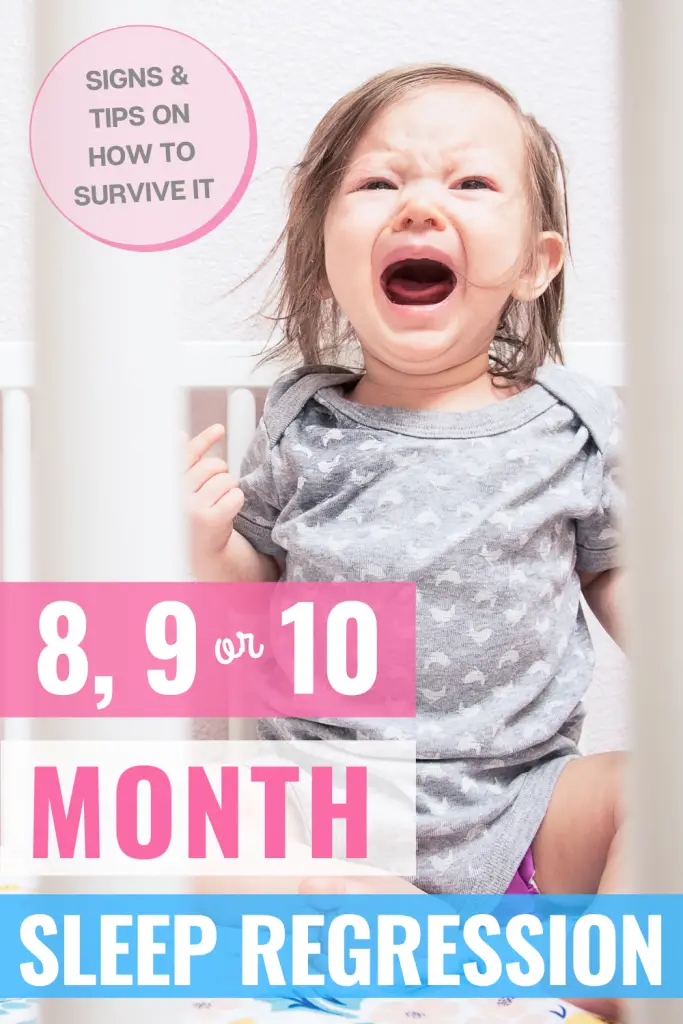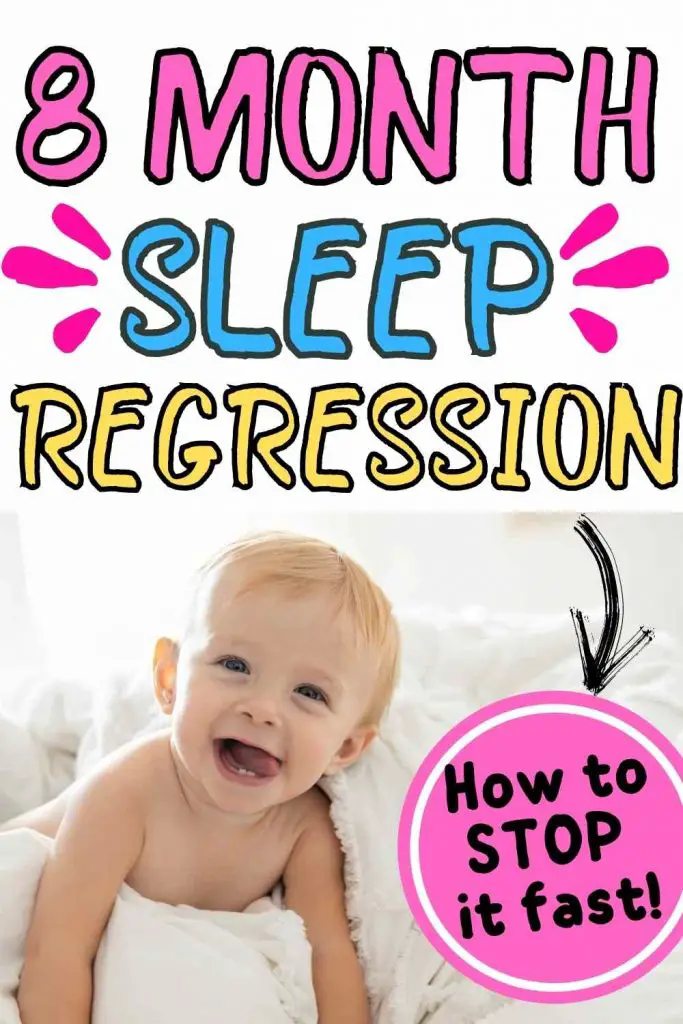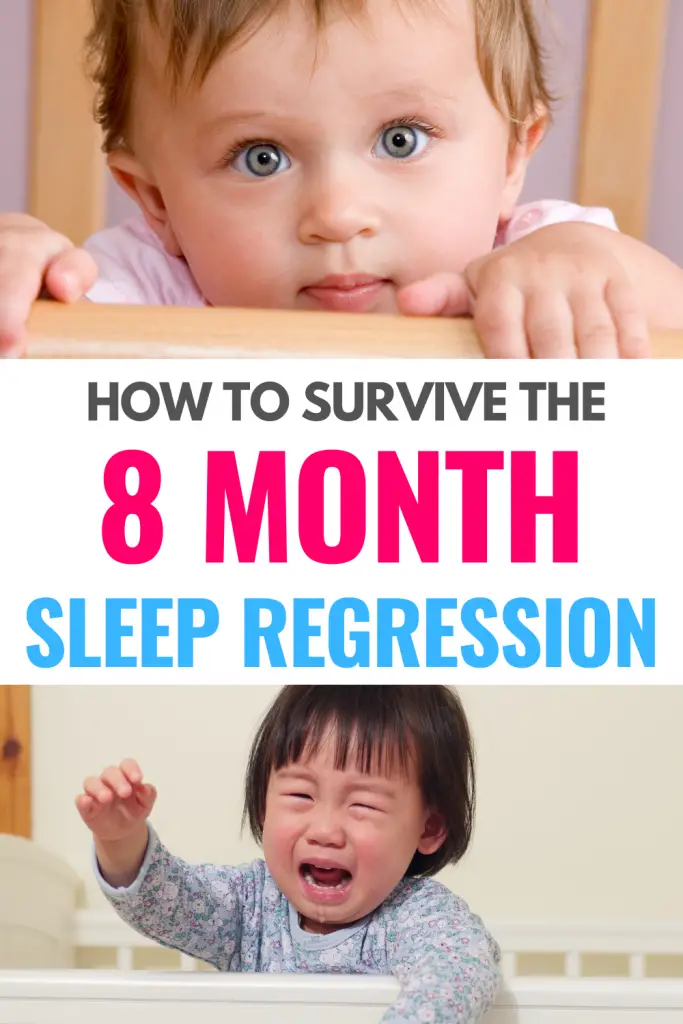The 8 month sleep regression, which often evolves into the 9 or 10 month sleep regression, is all about the massive physiological developmental changes your baby is experiencing at this time. At this age, most babies are learning to crawl or even stand, and they will have language explosions!
And, because babies like to practice at any time, they might start talking or standing in the crib instead of sleeping in the middle of the night. Not to mention many eight month old babies start transitioning from three naps to taking a nap twice a day. So they might start resisting some naps or waking earlier in the lunch nap rather than continuing to sleep.
All this can cause a big disruption to your baby’s usual sleep patterns and this sleep regression at eight months is very similar to the 6 month sleep regression. It really all depends on how soon your baby is reaching certain development milestones!
Just remember and take comfort in knowing that, like the 4 month sleep regression or the 6 month sleep regression, the 8 month development is a sign that your baby is properly developing and their sleep is changing!
Related:
- Baby waking up multiple times a night: here’s what you need to know
- How to Get Baby to Sleep in the Crib

Sleep Regression: What Causes It?
Here are some of the things that your baby may be experiencing and that could cause sleep regression.
1) Crawling, Scooting, Starting to Stand
Most babies between the age of 8 and 10 months will start to crawl, scoot or stand. Some babies even start to walk at 9 months! And babies like to practice, even at night, unfortunately.
If instead of sleep, this is the case, you might find your baby standing in the crib or crawling around. What might also happen is that, with all this energy that they are burning, they will start getting hungrier at night and ask for an extra feed.
2) Talking
By this age, most babies are constantly babbling and you might even hear “mama” or “dada”. This can be super cute during the day, but not so cute when your baby likes to practice in the middle of the night rather than sleep.
3) Separation Anxiety
Separation anxiety can also start with babies any time after 6 months, and you will find that a baby that was always OK to sleep in their own room, will start being upset all alone in their crib at night.
4) Teething
Teeth also start to emerge between 6 and 12 months, and the pain behind it might wake your baby up at night from a sound sleep.
My second baby for example, really seemed to be needing that extra feed at night. She started crawling and sitting by herself quite early at 6 months, and by 10 months she took her first step. I think she was just burning too much energy during the day! Plus, I was breastfeeding her and, with breastfeeding, it usually takes babies a bit longer to drop all feeds at night.
My first daughter, on the other hand, didn’t start moving until much later and was bottle fed. So, other than the occasional nights with teeth coming through, she cruised through the 6 and 8 month sleep regressions. She made up for it later on though!
What to Do: Tips on How to Survive Sleep Regression
Here are some tips on how to tackle and survive the change in sleep as soon as you’ve identified the causes of the sleep disruption and regression.
1) Tire them out before a nap
If your baby likes to be active at night rather than sleep because they are getting quite mobile, take advantage of all this energy and let them explore as much as possible during the day. This will tire them out.
2) Don’t give your baby too much attention
If your baby likes to stand up in the crib, try not to give them too much attention and see if they can get back down by themselves. Most babies will learn how to do this quite quickly.
You could also help them practice getting back down to sleep during the day: the more they practice, the better they’ll get at it.
3) Consider a Sleeping Bag
If your baby is getting stuck on the side of the crib, or getting tangled in sheets, consider a sleeping bag. This is actually the safest option for babies until they are old enough to put their blanket on or take it off by themselves.
My favorite one is the Merino Kids Go Go Bag: it is made of merino wool, which keeps baby cool in summer and warm in winter as they sleep, so you don’t need to by separate sleeping bags depending on the season. Plus, they have a size 0-2 years, which will last a long time.
Related:
– How to Dress Baby for Sleep
– The Best Baby Sleeping Bags for Winter
– The Best Baby Sleeping Bags for Summer
4) Let them Babble
If your baby likes to practice chit chatting at night when they sleep, try let them babble for as long as they want and see if they go back to sleep by themselves. If they start crying, you may need to look at some sleep training.
You can have a look here at gentle sleep training methods that involve little to no cry-it-out.
5) Have a Calm Sleep Routine
If they love all the social interaction before going to bed and are very excited when you put them down at night, they will struggle to fall asleep. You need to help them wind down by removing them from the exciting environment and create a calm sleep routine ready to be a good sleeper.
You can try a bath, a massage, a book or a song, for example. The more consistent you are with this routine, the easier it will be for your baby to associate it with sleep.
6) Try the Chair Sleep Training Method
If your baby seems to be suffering from separation anxiety and starts crying as soon as you leave the room, try the Chair or Sleep Lady Shuffle Sleep Training Method.

7) Be Patient
If they start waking up at night and seem to really need an extra feed, you might just have to be patient and offer that extra feed until they are more established on solids and don’t need it anymore. That said, by 9 month old, they shouldn’t need to feed at night anymore and sleep through.
8) Give them Comfort
If they are teething, again, you just need to be a bit patient and offer your baby all the comfort they need. What I found to be quite useful is applying some teething powder or teething gel on the gums before bedtime. Have a look here for teething signs and symptoms.
Or check out these other tips on how to sooth a crying baby to give your baby comfort.
One note based on personal experience: if your baby is hungry and starts feeding more (or again) at night, be aware that it could easily become a new sleep association. Particularly if breastfeeding. As in, they can’t fall back to sleep without you feeding them first.
If you see that the extra feed(s) drags for to long, you might want to loose that sleep association and look at some gentle sleep training.
Also, make sure that you are not experiencing a sudden drop in milk supply that’s making your baby still hungry at night. If that’s the case, have a look at these solutions on how to fix it, including drinks that can boost your milk supply back up.
Related:
- 6 Sleep Training Methods that ACTUALLY work (and that don’t involve Cry It Out!)
- Sudden Drop in Milk Supply (Signs, Causes & How to Fix it!)
- 14 Drinks that Increase Milk Supply
Waking Up and Signs Your Baby is Tired
One thing that I have learnt is that it is not always easy to identify the cause of your baby waking up at night and it can be a bit of a (not so easy) process of elimination. Be ready to be armed with a lot of patience.
Also, keep in mind that when babies are not too tired yet to go to sleep, they may still end up waking a lot at night. The same happens if they are overtired, because the stress hormone builds up and wakes them in between sleep cycles. Have a look here for a sample 6 month old baby schedule to make sure your baby is getting the right amount of sleep during the day.
Make sure you put your baby down to sleep when they are ready to sleep! Keep an eye on the signs that they are tired, and follow a good day routine. Signs that your baby is tired are:
- Pulling of the ears
- Rubbing the eyes
- Yawning
- Fluttering the eyelids or difficulty focusing
- Arching backwards
- Sucking the fingers
Tips for a Good Night Sleep
Here’s a few things that I would recommend you looked at to help your baby sleep soundly:
1) Have a Dark Room
Keep your baby’s room dark. Have black-out curtains or blinds that make the room as dark as possible to aid sleep.
2) Use a White Noise Machine
A white noise machine will create a comfortable environment that calms the baby, helping them to fall asleep faster. It is also great to cover up the noise of the toddler running around the house when the baby is trying to get to sleep or sleeping. You know what I mean if you have a toddler and a baby at home!
I use the Hushh Portable White Noise Machine, which is awesome. I can also take it with me in the car or in the stroller.
3) Have a Good Day Routine
A good day routine is actually key to a good night sleep and is as important as a good evening routine. This is because an overtired baby in the evening will not sleep well at night.
You can download a free 6 month old sleep and feeding schedule here.
4) Try Sleep Training
If you are exhausted, sleep deprived, and struggling with baby sleeping, and none of the information above seems to help, I would really recommend looking at sleep training and getting the professional help of a sleep consultant. The older the babies get the harder sleep training becomes, so it’s good to address bad sleeping habits sooner rather than later. I learned this lesson the hard way with my first daughter!
I have put together here a list of gentle sleep training methods that involve little to no crying if you want to have a look. There are also some programs that offer FREE resources.
Related:
- 8 Tips for New Parents to Avoid Sleep Deprivation
- 6 Sleep Training Methods that ACTUALLY work (and that don’t involve Cry It Out!)
5) Follow your Instinct
And the most important thing: follow your instinct and your baby’s cues! No matter what you read or learn, if it’s not working, it might not be the right thing to do for yourself or the baby at that point in time.
The sleep program I followed, for example, only encouraged a 10 minutes sleep in the afternoon at 6 months. Turned out that my second daughter was way too tired at night with just 10 minutes in the afternoon. Once I increased the afternoon sleep to a full sleep cycle of 45 minutes, she started sleeping better at night as well.
Sleep Tips at Eight Months
How long does the change in sleep last?
Sleep regressions in general usually last for 2 to 6 weeks. However, this is as long as you don’t begin to assist them back to sleep. If you do that, then your baby will get used to you putting them back to sleep and this will become a new sleep association for them. Meaning they won’t be able to fall back to sleep by themselves. If this happens, the sleep regression will drag for longer and you will need to look at sleep training.
How do you survive the disruption of sleep regression?
Be patient, this too shall pass! 🙂 Follow my suggestions above and talk to a sleep consultant, or go through a baby sleep program. Take a look at my list of gentle sleep training methods and programs that involve little to no crying if you want to have a look.
How do I sleep train my eight month old baby?
There are different sleep training methods that are suitable for a 8 month old and that you could try. I have put together a list of 6 of them.
Does sleep get better after the eight-month regression?
One thing that I learnt about having babies is that the path to improvement is never straight and you’ll go through so many ups and downs, you will stop caring about “when will it get better?” 🙂 It will get better, but then it might get worse again, and so on and so forth, possibly until they are teenagers, who knows. But we’ll all have to face other problems by the time they are 13!
Can I let my eight month old baby cry it out?
If you want to give Cry It Out (CIO) a go, you could start at 8 month old. However, know that CIO can be very hard on both the babies and the parents. There are other gentle sleep training methods that are effective and involve little to no crying. I have put together a list of 6 of them.
Summary
The eight-month sleep regression can be tough, but I am confident with this tips you can get on top of it! And, whatever happens, remember to be consistent with your approach 🙂
If your baby is older than 8-10 months and still waking up a lot, then also check these posts:
- Baby Waking Up Multiple Times a Night: here’s what you need to know
- 6 Sleep Training Methods that ACTUALLY work (and that don’t involve Cry It Out!)
- 18 Pacifier Alternatives (for Babies & Toddlers!)
For some breastfeeding or bottle feeding tips and information:
- How to Stop Breastfeeding a 1 Year Old at Night
- 25 Formula & Bottle Feeding Tips (to Make it Easier!)
- Paced Bottle Feeding (Benefits & Tips to do it Right!)
- Sudden Drop in Milk Supply (Signs, Causes & How to Fix it!)
- Baby Suddenly Refusing Bottle (Why & 19 Things to Try!)
Did you find this useful? Pin It!


